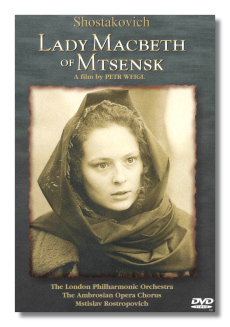
The Internet's Premier Classical Music Source
Related Links
- Shostakovich Reviews
- Latest Reviews
- More Reviews
-
By Composer
-
Collections
DVD & Blu-ray
Books
Concert Reviews
Articles/Interviews
Software
Audio
Search Amazon
Recommended Links
Site News
 DVD Review
DVD Review
Dmitri Shostakovich

Lady Macbeth of Mtsensk
- Katerina: Marketa Hrubesova (Galina Vishnevskaya)
- Sergej: Michal Dlouhy (Nicolai Gedda)
- Boris: Petr Hanicinec (Dimiter Petkov)
- Zinovy: Vaclav Neckar (Werner Krenn)
Ambrosian Opera Chorus
London Philharmonic Orchestra/Mstislav Rostropovich
Directed by Petr Wegl
Image Entertainment DVD 14381-5655-2 No multi-angle, no commentary
Rape, murder, torture, lechery, and hot steamy sex, lots of it. If Pravda's writers had DVD players in 1936, they might have been too glued to the screen to have waged the fuss they did. All elements come together in this well-orchestrated, finely produced film. It may very well be the dream Lady Macbeth we've been waiting for. Rostropovich conducts a stellar cast, including his own wife in the role of Katerina, the eponymous Lady Macbeth. If this film is any indication, director Petr Wegl has a future filming operas that may rival Zefferilli's productions.
It wasn't the seaminess of his only opera that caused Shostakovich's first running afoul of Stalin and his cultural commissars. More likely it was his skillful rendering of this tale of wifely treachery against the backdrop of truly scary and sometimes dissonant music. In the opening scenes, as Katerina sings of her boredom, alternating wistful longing with enraged frustration, it is hard to stop watching. The muted reds and the Vermeer interiors cry out her passionate resentment of her plight, her loveless marriage to an oafish merchant. Later, while she's undressing, she sings a melancholic aria about her loneliness, Vishnevskaya full-palletted soprano voice rising in desperation. This aria should be in the repertoire like the "Willow Song" in Verdi's Otello. The bass register of Dimiter Petkov as her father-in-law Boris exudes crass menace, dominating her in his son's absence, telling her when to sleep, while making passes at her whenever he can. The scene in which she poisons him in a darkened room, although harrowing, feels just. It lingers in memory long afterward.
The two love scenes between Katerina and her paramour Sergej are skillful contrasts. The first has exquisite tension and a furious outpouring of passion. The push and pull of their body language is absolutely riveting. The music in this convincing love scene has an intense sexuality that must have driven Stalin nuts. There is even humor, as a descending horn sounds when Sergej sinks to the floor, exhausted. Their second scene is almost idyllic, yet Shostakovich doesn't spend more than a minute on lyrical interludes. Almost immediately, the frenetic murder of her jealous husband intrudes and shatters their dream world.
Dubbed, filmed operas like this one are preferable to live stage productions. Despite the fact that footsteps don't sound when people walk and that Marketa Hrubesova should move her mouth more when enraged, the cinematic effects are stunning. Sumptuous brown interiors blend well with nude flesh that few divas would dare reveal.
Unfortunately, this opera loses its spunk in its last act, after Sergej is arrested, and descends into second-rate verismo. Katerina changes from mover to victim and self-destructs, mourned only by a doleful chorus of convicts, which lasts only a minute before the final desolate camera angle of the river. Wegl and Rostropovich have created an impressive work that rivals Francesco Rosi's Carmen (1984) with Plácido Domingo and Julia Migenes.
Copyright © 1999, Peter Bates

















